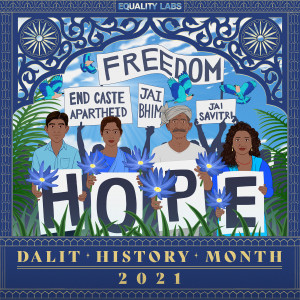
April is – besides Easter, Pesach, and Ramadan – also the Dalit History Month. It is known in India but also recognized in Canada. Like the Black History month, the idea is to remember and shine a light on important figures of the Dalits – a social class that was and to an astonishing degree still is discriminated against, because it “enjoys” a lower social status than other classes. The discrimination is still present despite legal, political and cultural efforts to undo the hierarchy thinking in the minds of people.
There have been Dalits who worked for their rights and towards equality, as part of a social/political/religious movement. Approximately, this movement can be compared to European enlightenment.
Of course, it is not the end goal to have only one month of “Dalit history” in focus. The task is rather to include Dalit history throughout the year. Some of the struggles are not only restricted to India but relevant to the human history towards equality.
I like to sketch one very brief line of thinking: one leading Dalit figure with a significant influence beyond Dalits is B.R. Ambedkar. B.R Ambedkar read Buddhist scripts and created a more accessible narrative of Buddha. This socially engaged Buddhism is more accessible to the Dalit struggle.
Western readers may compare the “communist hypothesis” that sees religion only as a distraction, with the hypothesis of B.R. Ambedkar, that religion is both a part of the problem (in the form of a traditionalist Hinduism whose representatives were not able to realize the need to re-define social hierarchies towards more equality) and part of the solution (an inspired reading of Buddhist scriptures promised a better future, and created a historic and spiritual background to engage socially and politically for equality).
For example, it was inspiring to see a Buddhism that does not focus only on meditation and “idling”, but aims to realize social equality. Those who like to see examples of a “secular religion”, the history of Navayana Buddhism is worth a closer look.
“Ambedkar’s chief conversation partner is Marx, with whom he agrees about the end, the dissolution of private property, but not about the means. For Ambedkar, the means is the Buddhadharma, with its therapeutic project for the individual and its social program in the form of the saṅgha that can affect real change at the base. Ambedkar’s sense that religion, in the form of an enlightened religion of principles, is necessary for moral orientation marks the divergence of his thought from that of Marx.”
~ Timothy Loftus (2021): Ambedkar and the Buddha’s Saṅgha: A Ground for Buddhist Ethics. In: CASTE: A Global Journal on Social Exclusion. Vol. 2 No. 2 pp. 265–280.